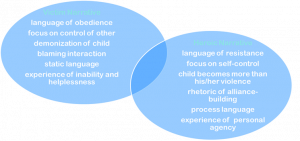When not to use NVR with a family?
This is a question prompted by noticing the types of referrals received over the years and by questions raised by participants in training contexts. It also seems that this year, the year of Covid 19, and driven by rising need and reduced capacity in the various support systems around families, pressures to find rapid relief, a ‘fix’ for a family in need, are increasing. We have also heard of courts requiring families to undertake an NVR intervention as part of a process of returning a child home from Care.
Our process of training practitioners in the theory and practice of NVR at foundation and advanced levels is predicated on the principles of what Haim Omer calls ‘New Authority’. There are certain key principles of New Authority as stated by Omer:
- Adults are emotionally closer to their child, not emotionally distant.
- Adults around the child pay attention to emotional support and containment of the young person.
- The family is an open system, connected to school and community, and adults are accountable to people outside the nuclear family for their actions. This allows for the building of alliances with different systems.
- The family is a boundaried yet transparent system.
- Adults do not derive legitimacy from their rank, e.g. “I’m your father so you will do as I say!” but from the social systems around them. This counters outdated authoritarian attitudes to raising children which in modern society have lost legitimacy.
NVR and New Authority are interlinked, and action taken in any NVR intervention can be thought about in terms of how aligned parents’ actions are with these principles.
As clinicians, when we initially get to know parents in the course of our NVR work, we use our skills and training to focus on building a therapeutic alliance; listening to the parent’s story, being both compassionate and appreciative witnesses to their struggles and the attempts they have made to resist non-violently. In many cases, moving towards embodying NVR is an unfolding process and will entail parents challenging their deeply held beliefs about their role as parents and opening themselves to the realisation that they cannot control the child, only themselves. As Haim Omer says “It is intensely anxiety provoking and liberating to come to the realisation, that we cannot control another person.”
In our work, we go gently but firmly with our parents in the direction of non-violent resistance, ‘leading the horse to water’ as the saying goes. However, the saying also ends ‘but you can’t make it drink’. However, you can lead the horse around the lake a few times until it gets thirsty and wants to stop and take a drink. This process requires of us persistence, tolerance, a clear direction of travel and small steps, with maybe stops to rest and admire the view.
 However, what is important to recognise, is that the parent needs time to develop some internal motivation to change, if NVR is to work. Change requires a parent to start moving towards New Authority principles and away from authoritarian and distancing parenting styles. It requires that the parents start resisting impulses to blame and shame (themselves and the child), that they embrace gestures of care and reconciliation towards their child and are willing to involve a network of supporters who will act as a corrective to the child’s violent and harmful behaviour, as well as their own.
However, what is important to recognise, is that the parent needs time to develop some internal motivation to change, if NVR is to work. Change requires a parent to start moving towards New Authority principles and away from authoritarian and distancing parenting styles. It requires that the parents start resisting impulses to blame and shame (themselves and the child), that they embrace gestures of care and reconciliation towards their child and are willing to involve a network of supporters who will act as a corrective to the child’s violent and harmful behaviour, as well as their own.
In NVR, we see such change and personal growth as possible. With careful, close attention to the parents’ experience and with support to imagine themselves taking action with which they will both resist and reconcile with their child – to rekindle the caring dialogue, as we would say in NVR – change is possible. To this end, we are very mindful of how we use language and of the importance of the therapeutic relationship, taking a stance of curiosity and non-blame. We often talk about ‘creating a preferred story’ in our NVR work, and the process may be depicted as in the diagram below. It can be captured with questions such as: “How do you want to see yourself as a parent?” “What will the relationship with your child look like?”
 This therapeutic process requires time and investment from services, and in order to help parents move from a position that is both authoritarian and helpless to one that expresses attitudes connected to new authority, the intervention must address the parents change-related needs. However, in some instances, NVR interventions are reduced to a delivery of techniques as ‘tools’ for the parent in quite a behaviourally oriented way. So, we see for example 6 session NVR groups being offered, which are simply too short and do not address the therapeutic needs of the parent. When time is not given to NVR, parents are left confused and unsupported and can feel pressured, alone and/or coerced into using NVR methods without embodying its principles. There is then the potential for NVR to become – in the widest sense – violent and punitive as an intervention when, e.g. parents use people who act in dominant and coercive ways as ‘supporters’, who then attempt to increase control of the child and escalate already dangerous situations even further. Parents may also misuse the ‘sit in’ to punish, shame or humiliate the child. Parents may be unwilling and /or unable to give up dominance-oriented ways of behaving despite the best efforts of the practitioner where there is a very limited time scale placed on service provision and little time to work on a deeper therapeutic level . Perhaps some parents, especially those mandated by courts to undertake NVR, may not quickly appreciate how any practitioner can help them; perhaps they need time to contemplate the benefits of receiving treatment for drug or alcohol misuse; perhaps they are unfamiliar with a therapeutic approach which asks them to reflect on their part in escalation processes and on family relationships, and perhaps they are disconnected from their capacity to empathise or listen to the child and need careful, calibrated work to help them see past the behaviour and to address the unmet needs of their child.
This therapeutic process requires time and investment from services, and in order to help parents move from a position that is both authoritarian and helpless to one that expresses attitudes connected to new authority, the intervention must address the parents change-related needs. However, in some instances, NVR interventions are reduced to a delivery of techniques as ‘tools’ for the parent in quite a behaviourally oriented way. So, we see for example 6 session NVR groups being offered, which are simply too short and do not address the therapeutic needs of the parent. When time is not given to NVR, parents are left confused and unsupported and can feel pressured, alone and/or coerced into using NVR methods without embodying its principles. There is then the potential for NVR to become – in the widest sense – violent and punitive as an intervention when, e.g. parents use people who act in dominant and coercive ways as ‘supporters’, who then attempt to increase control of the child and escalate already dangerous situations even further. Parents may also misuse the ‘sit in’ to punish, shame or humiliate the child. Parents may be unwilling and /or unable to give up dominance-oriented ways of behaving despite the best efforts of the practitioner where there is a very limited time scale placed on service provision and little time to work on a deeper therapeutic level . Perhaps some parents, especially those mandated by courts to undertake NVR, may not quickly appreciate how any practitioner can help them; perhaps they need time to contemplate the benefits of receiving treatment for drug or alcohol misuse; perhaps they are unfamiliar with a therapeutic approach which asks them to reflect on their part in escalation processes and on family relationships, and perhaps they are disconnected from their capacity to empathise or listen to the child and need careful, calibrated work to help them see past the behaviour and to address the unmet needs of their child.
If these constraints in the parent-child relationship are not seen and addressed, either because the breadth and scope of the intervention cannot sufficiently address them, or because in spite of the practitioners’ best efforts, the impasse has not been overcome, then it indicates that NVR is likely to fail as other interventions have probably also failed, and the reputation of NVR can be undermined. Though NVR has great potential to transform relationships, it requires commitment and dedication of focus on the part of the parent who will be supported by equally committed and dedicated practitioners. This is central to the NVR process. This is also where NVR can lose effectiveness. As NVR practitioners, we are generally very invested personally and professionally in the idea of bringing about peace in the world. However, we may, with good intentions, actually do harm, perhaps unconsciously becoming too over powering in trying to ‘sell’ NVR to parents, aware of the urgency of the need to make changes but unsupported by systems to provide the level of NVR support needed. Pressures from referrers and courts can also contribute to practitioners feeling the need to insist – which would be anathema to the nonviolent principle of overcoming the ‘illusion of control’.
 So, this is a really a call to practitioners to step up our personal presence as practitioners and to not be afraid of drawing our own line in the sand when the situation demands it. From the perspective of safe-guarding it is necessary, for the reputation of NVR it is important, and it is also necessary from the perspective of our own wellbeing as practitioners.
So, this is a really a call to practitioners to step up our personal presence as practitioners and to not be afraid of drawing our own line in the sand when the situation demands it. From the perspective of safe-guarding it is necessary, for the reputation of NVR it is important, and it is also necessary from the perspective of our own wellbeing as practitioners.
In order to retain the integrity of NVR as an approach, practitioners should be clear that diluting the central principles will lead to poorer outcomes and is potentially harmful.
By Jill Lubienski & Peter Jakob
